- Home
- Seanan McGuire
One Hell of a Ride Page 2
One Hell of a Ride Read online
Page 2
“I went my whole life without meeting any monsters, city boy,” said Fran as they walked. “I meet you, and inside of a week, I’ve got cougar-snakes hiding in the circus and trains driving me straight to Hell. I think you might be a bad influence.”
“If it makes you feel any better, I know about hell-bound trains because of secondhand reports, not because I’ve ever actually been on one before,” said Jonathan. “I recognized that boundary imp from sketches in my father’s books.”
“So, maybe I’m a mite odd, but knowing that the one person who has a clue about surviving this is working purely from book learning, and not experience? Doesn’t make me feel any better,” said Fran. “Actually, it makes me feel like I should be making peace with my maker.”
“Do let me know how that turns out,” said Jonathan, and opened the door into the next car.
It was questionable who was more surprised: them, or the two boundary imps who had been devouring the man on the train floor. One of the imps raised its head and snarled. The other dispensed with pleasantries entirely, and attacked.
Jonathan shot the attacker twice in the forehead while it was in mid-leap. Fran’s throwing knives were quieter, but just as deadly; one caught the second imp in the throat, while the second pierced its left eye. Both imps fell, and didn’t move again.
“The gunfire may attract others,” he said, moving forward and nudging the dead man with his toe. It was the man he’d seen before. “Poor bastard.”
“Then we’d better move,” said Fran. “Can I get my knives back, or is their blood poison, too?”
“Avoid the claws and fangs and you’ll be fine,” said Jonathan. He waited for Fran to squeeze past him before turning and closing the door. “It’s best if you can retrieve them. I don’t know how many imps are on this train.”
“You sure know how to make a girl feel safe, don’t you?” Fran bent over the imp, pulling her knives free and wiping them on her skirt before making them vanish again. “I swear, city boy, it’s a miracle you’re not married already.”
“I’ve had other things to occupy my time,” said Jonathan. He stepped over the dead man. “Today, for example, marriage takes second place to getting out of here alive. I thought that might be a goal that could hold your interest.”
Fran glared as she let him pass her, and the two resumed their walk along the length of the train. Jonathan kept his eyes on the seats ahead of them, scanning for hints of motion. Fran tried to do the same, but couldn’t stop herself from sneaking glances out the train windows. She shuddered.
“What kind of thing lives in a place like this?”
“Nature is amazing in its variety, its tenacity, and its bloody-mindedness,” said Jonathan. “If a place can exist, there’s something that can live in it—and from what I understand about the worlds surrounding ours, there are no places too strange to exist.”
“It’s the sort of thing drives a person mad,” muttered Fran.
“Only if you dwell on it,” said Jonathan. “Think about other things. More pleasant things.” Michigan autumns; his mother’s potato casserole; the way the mice sang at the first snowfall every year. The color of Fran’s hair…
Some things were pleasant and dangerous at the same time. Jonathan shook his head to clear it, and kept walking.
“How can the railroads know about this and not do anything?”
“By the time they found out this was a risk, they’d already spent several fortunes crossing the country in iron,” said Jonathan. They were almost to the next door, and nothing further had attacked them. “A few lives must have seemed like a small price to pay for progress.”
“But you don’t think that way.”
It was a challenge, and even in their current straits, Jonathan couldn’t let it go unanswered. He turned to face her. “My family is dedicated to preserving life, not throwing it away,” he said. “If it had been up to me, the entire enterprise would have been halted after the first dimensional rift, and every engine would have been rebuilt with silver fittings to keep the imps at bay. Since it wasn’t up to me, all I can do is try to save the lives of those who made it through the crossing, and curse the men who own these tracks a little more. Every life is worth preserving.”
“That’s why you don’t want to go out and slaughter these imps unless they’re coming at us.”
“That’s right.” Jonathan looked at her. “If that’s going to be a problem, we can part company once we’re back in our world. I won’t hold it against you.”
To his surprise, Fran smiled. “Shoot, city boy, you take a girl to Hell and then you think you can just leave her at the next station? I don’t think so. I want to see what you’re going to throw at me next.”
Jonathan shook his head, and kept on walking. The woman was clearly insane. As she was also heavily armed, that might prove to be a good thing in their current situation.
The next two cars were empty, although broken windows and distressing stains on the carpet and seats made it clear that they hadn’t started out that way. Fran paled at the sight of a little girl’s floral bonnet lying on the floor, blood soaked through the dangling ribbons. She didn’t say anything. Neither did Jonathan. Sticking close together in case of ambush, the two made their way down the still-moving train, finally reaching their first major obstacle: the door to the dining car.
“The cutlery on this train is real silver,” he murmured, placing a hand on the door handle, but not pushing it open. “That means there’s a relatively strong chance that we may have survivors here, assuming they were smart enough not to open the doors after the initial assault had passed.”
“That’s a good thing, right? Survivors is a good thing. I don’t want to be the only person on this rolling abattoir.” Fran offered him a quick, lopsided smile. “See, I put that big word in there to make you feel more comfortable. I’m catching on.”
Jonathan smiled back. “I appreciate the effort. And yes, survivors would be a good thing, assuming they haven’t been driven into religious mania by the sight of ‘demons’ pouring down the length of the train.”
“And if they have?”
“They may decide to stab us to death with their remaining cutlery.”
This time, Fran’s smile had more of an edge to it. “Good thing we have the advantage where weapons are concerned, isn’t it?”
“Yes, I suppose that’s true.” Raising his voice, Jonathan called, “This is railway security! We’re coming in now!” Then he pushed down on the handle, and opened the door to the dining car.
Six forks and a spoon clattered off the doorframe to either side of them. A tea saucer—not silver, but the people holed up in the dining car had clearly hit the point at which any port in a storm began to seem acceptable—hit Jonathan in the middle of the chest, bounced to the floor, and shattered. He blinked at it, and then turned to survey the survivors.
There were seven of them, men, women, and children, all rumpled and dotted with stains of suspicious origin. Two dead boundary imps lay on the floor of the car, staring blankly up at the ceiling. Tablecloths covered three other bodies; the human inhabitants of the car who hadn’t survived the initial wave.
The survivors stared back. Then an elderly woman in a feathered hat gestured for them to come forward, hissing, “What are you trying to do, you fools, get us all killed? Get in here!”
Jonathan and Fran got.
The survivors remained huddled together, not visibly relaxing until the door was firmly closed. Something gritty was worked into the carpet just over the threshold. Jonathan looked down. Salt. Useless against boundary imps, but still…it was a good sign that at least one of the survivors had some understanding of the actual world around them, not just the so-called “natural world.”
Fran, meanwhile, was looking around the dining car, checking for escape routes and signs of danger. Three of the windows were broken; these had been barricaded off with tables tipped onto their sides, keeping anything else from coming in without warning. Th
ey didn’t have enough tables to block all the windows, and so the unbroken glass had been left alone, showing the eerie landscape rolling by outside.
“Who are you people?” demanded the woman in the feathered hat, who seemed to be serving as the leader of the survivors. “Why didn’t those demons eat you?”
“They don’t like silver,” said Jonathan. “We were fortunate enough to be armed when the attack came.” He lowered his gun as he looked around the car, finally focusing on the three covered bodies. None of them looked intact. “How did you survive?” he asked, attention going back to the survivors.
“We threw spoons at the demons,” said a little boy, half-hidden behind the voluminous skirts of a woman that Jonathan hoped was the child’s mother. It would be bad enough to lose someone in a situation like this. It would be worse to be orphaned. “They didn’t like the spoons, so they tried to go away.”
“And then we stabbed them with the knives from the service cart,” said the elderly woman, as calmly as if she’d been discussing the weather. “Not before a few folks got bitten. Are we dead? Are we damned?”
She asked the question like it was somehow entirely reasonable. Jonathan shook his head. “No, ma’am, we are neither dead nor damned. We are simply off the beaten path at present, and need to find our way back onto the straight and narrow.” Out of the corner of his eye, he could see Fran moving toward one of the cloth-swaddled bundles. He wanted to shout for her to stop. He couldn’t think of a way to do it without upsetting the people who watched him, wide-eyed with fear, waiting for a miracle.
The woman scowled at him. “How do you propose we do that?”
“My associate and I are on our way to find the conductor. If all is well, we should be able to assist him in steering us safely back to the track we should have been following all along.” And if all is not well, at least we’ll be at the front of this damned conveyance, and should see death coming well before it hits us.
“Take us with you,” said another of the survivors. It was somewhere between a command and a plea.
Fran lifted the edge of one of the tablecloths and recoiled, dropping it again, as she clapped her hand over her mouth to stop herself from gagging. She staggered backward. Jonathan caught her by the elbow before she could fall.
“I am afraid that would not be advisable,” he said, as smoothly as if he weren’t holding his only partner upright by the arm. “Two people can cover one another. More than that…you would be safer staying here. We’ll all be safer if you stay here.”
Fran managed to get herself back under control, straightening up and pulling her arm away. “Honestly, if I were you, I’d stay in this car with the doors locked as tight as a hen’s hiney, and not come out until a man with a big badge and a bigger gun promised me the demons were gone.”
Maybe it was her accent—something about hearing a voice that dripped with the twang of the American West invoking lawmen and demons in the same breath was credible, where Jonathan’s calm Midwestern delivery made the same subject matter seem ludicrous. Whatever the reason, the survivors of the ill-fated dining car calmed, their attention shifting to Fran.
“Who are you?” asked the elderly woman again.
Fran smiled. It was an oddly sweet expression for a woman with a smear of blood on her cheek and a knife in either hand. “Well, ma’am, that depends on where you’re looking, but right now, right here, I suppose we’re the cavalry. Would it be all right with you if we moved on along?”
The survivors looked at each other. The elderly woman nodded. And then, without another word said, all of them stepped aside, clearing a path for Fran and Jonathan to walk along.
As they passed the elderly woman she said, in a voice barely above a whisper, “You get those bastards for what they did to my Vince. You get them.”
“We’ll do our best, ma’am,” said Jonathan. Together, he and Fran managed to unblock the door at the end of the dining car, and they passed on, one step closer to the engine, and the ending.
Only one empty car stood between them and the engine. Fran and Jonathan walked side-by-side, weapons out and ready for attack. Nothing came lunging out of the shadows. Somehow, that didn’t help their nerves.
“That man, back there…” began Fran.
Jonathan knew from her tone that she wasn’t referring to any of the survivors. “I wish you hadn’t looked, Fran.”
“He was just a skeleton. There was this stuff around him, like…like when Andres would make beef stew for the carnival.”
“That was the rest of the gentleman in question. The venom of boundary imps is necrotizing, and it was never meant to interact with human flesh. The results are…dramatic, when it happens.” Almost without thinking about what he was doing, Jonathan reached out and squeezed her elbow with his free hand. “He died quickly.”
“But he decayed even quicker, is that it?” asked Fran.
Jonathan didn’t have an answer for that.
She sighed. A boundary imp sprang from behind a seat, claws extended, and she put three knives into its forehead before it had time to realize that perhaps it was attacking the wrong disheveled travelers. The imp fell back again, dropping out of sight. “This monster-hunting stuff, it’s harder than it looks, isn’t it?”
Somehow, Frances Brown, I get the feeling you’ll do just fine, thought Jonathan. Aloud, he said, “It has its challenges.”
“I tend to view melting as a bit more than a challenge.”
“I’m assured it’s a quite difficult thing to do,” Jonathan said. Another boundary imp popped up. He shot it in the throat, and it fell back down. “Look at it this way.”
“How’s that?”
“At least you’re not bored anymore.”
Fran was too smart to yell at him as he pried open the door into the lead car. But she glared at his back, and covered him as they walked into the hot darkness of the engine.
She didn’t realize that he’d stopped until she slammed into him, nearly dropping one of her dwindling supply of knives. “What the—” she began…and went quiet as she looked past him to the man shoveling coal into the engine.
The man with the snakes where his hair should have been.
“Johnny?” whispered Fran, in a voice that she couldn’t quite keep from shaking. “What is that?”
“A Pliny’s gorgon, I believe,” said Jonathan quietly. Raising his voice, he said, “Ah, excuse me, sir? Are you the original conductor?”
“If you’re here to shoot me or hit me over the head with a chunk of timber, do it and be done,” snarled the gorgon, continuing to shovel. “We’re bleeding momentum, and I’d rather be dead before we run out completely.”
“I believe that means ‘yes,’” Jonathan murmured to Fran. He took a step forward. “We’re not here to accost you. If anything, we’re here to help. My friend and I—say hello, Fran—would rather make it home alive, if it’s all the same to you.”
The man didn’t turn, but several of the snakes on his head did, swiveling around to eye the people behind him with reptilian suspicion. “The snakes don’t bother you?”
“Sir, we’re traveling in the company of a colony of Aeslin mice, and I have recently spent much of a day preparing the body of a rare North American Questing Beast for mail transport. At this point, if the snakes on the head of a Pliny’s gorgon bothered me, I would need to reexamine every choice I have made in my adult life.”
“Plus they’re kinda pretty, if you don’t think about them too hard,” said Fran, almost cheerfully.
There was a pause while the conductor considered their statements, and the many levels of strangeness they contained. Finally, he said, “If one of you could go up front and take over the steering, I’d be much obliged. I think we lost my assistant a little while ago, and I haven’t dared stop shoveling long enough to go up there and find out for sure.”
“I’ve got it,” said Fran, and vanished into the dark. There was a screeching sound a moment later, followed by the meaty thud of another
imp hitting the boards.
“There’s a shovel in the corner,” said the conductor, continuing to work.
“Right,” said Jonathan. Shoving his pistol back into his belt, he rolled up his sleeves and went to retrieve the shovel.
“Your lady friend…if you don’t mind my saying, she’s a bit odd.”
“You have no idea,” said Jonathan, with fond sincerity, and set about moving coal.
Fran had never steered a train before, but the theory turned out to be refreshingly clear when one was trying to do nothing more complex than remain on a set of tracks which the train—thanks to the laws of physics—had no real interest in leaving anyway. The boundary imps had eaten well, and had gone back to the hills with their spoils, leaving the few survivors still on the train untroubled.
Jonathan and the conductor, whose name turned out to be Clark, continued shoveling coal into the hungry engine until the train hit a bump, and the air, even in the dark, crowded space they inhabited, seemed to suddenly clear. Fran’s whoop of triumph was loud enough to carry even through the closed door.
“That’s that, then,” said Clark. He put his shovel down and pulled a lever on the side of the boiler, venting steam into the cabin. The train began losing speed.
Jonathan coughed. “What do you mean?” he asked.
“We’re back in the right America.” Clark grabbed a conductor’s hat from a peg on the wall, pulling it on over his snaky tresses. Then he turned to face Jonathan, offering the other man a regretful smile. “We’re home. It’s on the railroad from here. They’ll come for cleanup, pay off the survivors, ask their questions, and sort things out from there.”
The men who owned the railroads were aware of many things. Not all of them were good for a man in Jonathan’s position—especially not a man who was traveling with an unidentified corpse, a colony of talking mice, and a woman violent enough to be mistaken for a member of the Covenant of St. George. The railroads employed too many cryptids to be fans of the Covenant.

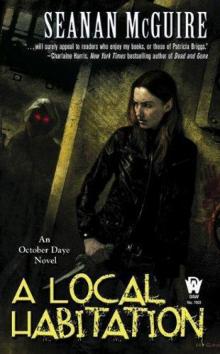 A Local Habitation
A Local Habitation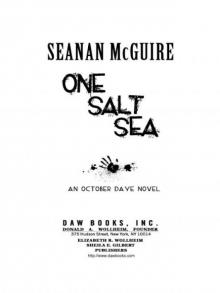 One Salt Sea
One Salt Sea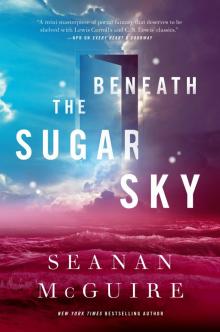 Beneath the Sugar Sky
Beneath the Sugar Sky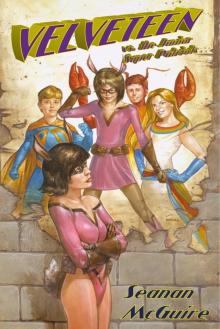 Velveteen vs. The Junior Super Patriots
Velveteen vs. The Junior Super Patriots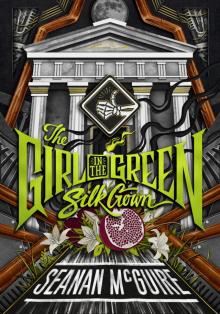 The Girl in the Green Silk Gown
The Girl in the Green Silk Gown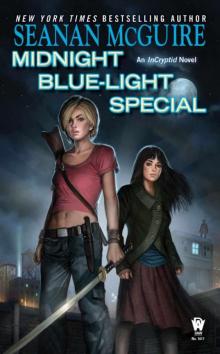 Midnight Blue-Light Special
Midnight Blue-Light Special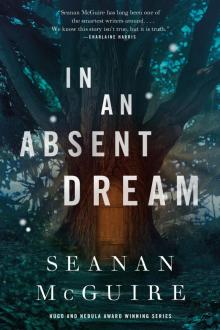 In an Absent Dream
In an Absent Dream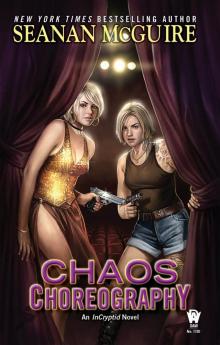 Chaos Choreography
Chaos Choreography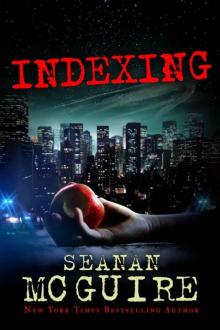 Indexing
Indexing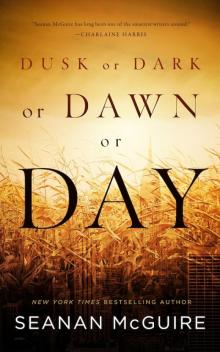 Dusk or Dark or Dawn or Day
Dusk or Dark or Dawn or Day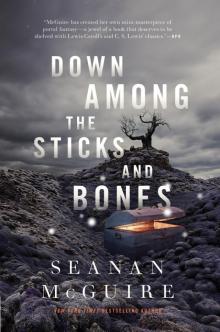 Down Among the Sticks and Bones
Down Among the Sticks and Bones The Razor's Edge
The Razor's Edge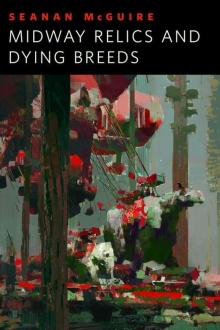 Midway Relics and Dying Breeds
Midway Relics and Dying Breeds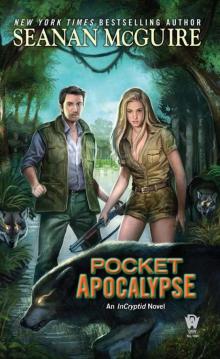 Pocket Apocalypse
Pocket Apocalypse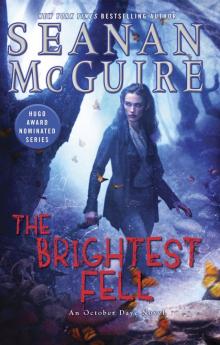 The Brightest Fell
The Brightest Fell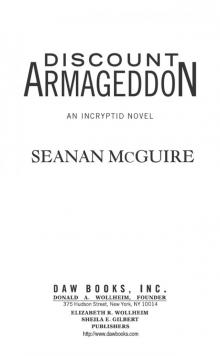 Discount Armageddon
Discount Armageddon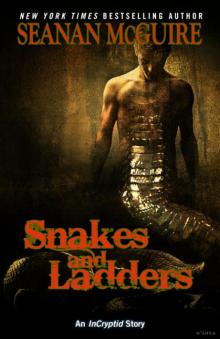 Snakes and Ladders
Snakes and Ladders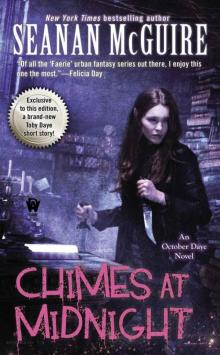 Chimes at Midnight
Chimes at Midnight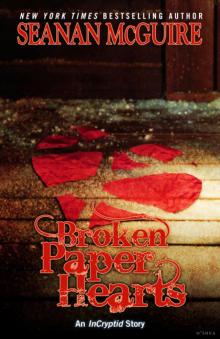 Broken Paper Hearts
Broken Paper Hearts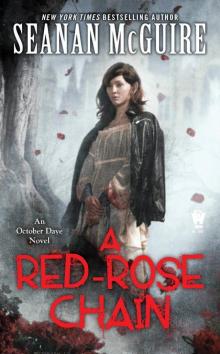 A Red-Rose Chain
A Red-Rose Chain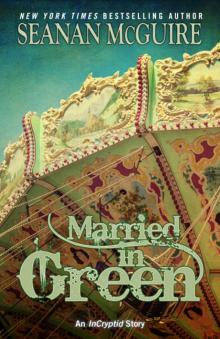 Married in Green
Married in Green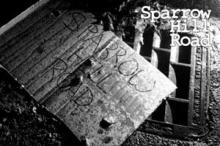 Sparrow Hill Road 2010 By Seanan
Sparrow Hill Road 2010 By Seanan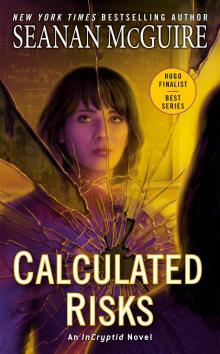 Calculated Risks
Calculated Risks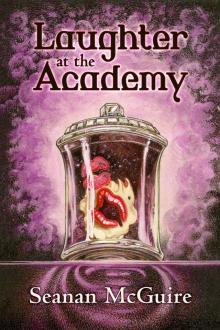 Laughter at the Academy
Laughter at the Academy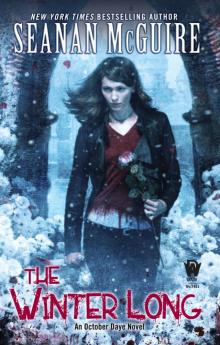 The Winter Long
The Winter Long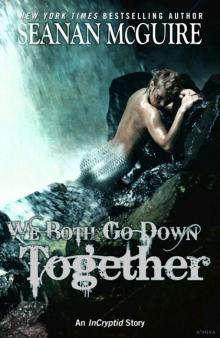 We Both Go Down Together
We Both Go Down Together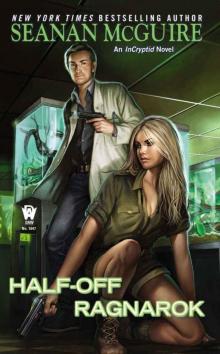 Half-Off Ragnarok
Half-Off Ragnarok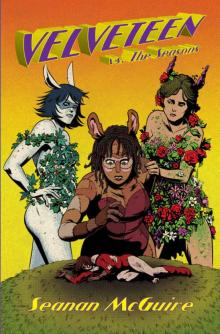 Velveteen vs. The Seasons
Velveteen vs. The Seasons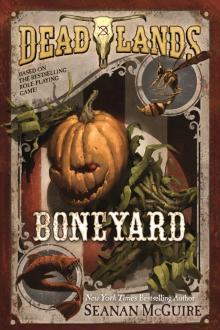 Boneyard
Boneyard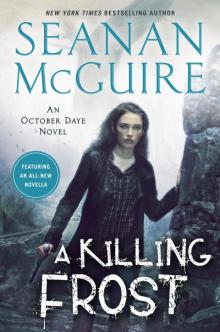 A Killing Frost
A Killing Frost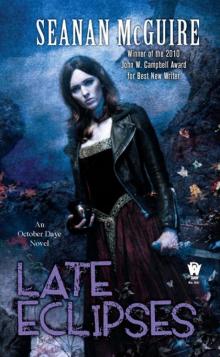 Late Eclipses
Late Eclipses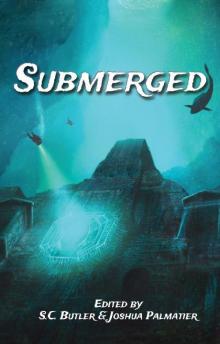 Submerged
Submerged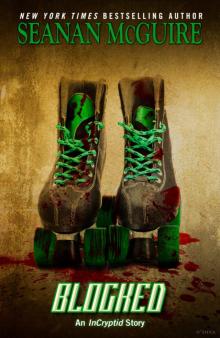 Blocked
Blocked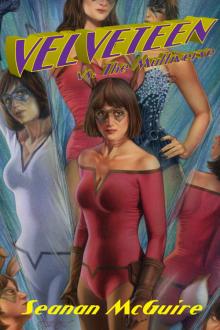 Velveteen vs. The Multiverse
Velveteen vs. The Multiverse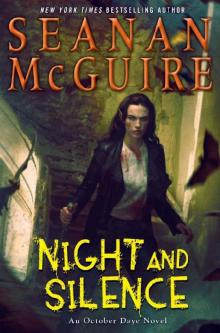 Night and Silence
Night and Silence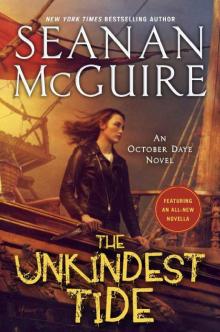 The Unkindest Tide (October Daye)
The Unkindest Tide (October Daye)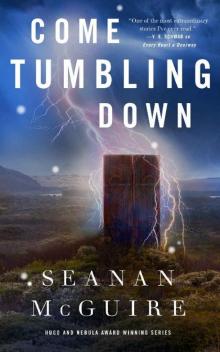 Come Tumbling Down (Wayward Children)
Come Tumbling Down (Wayward Children)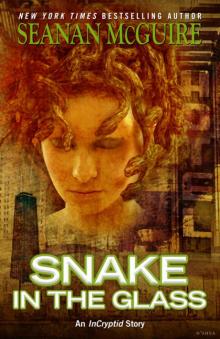 Snake in the Glass
Snake in the Glass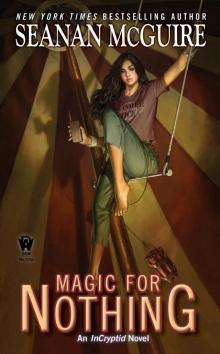 Magic for Nothing
Magic for Nothing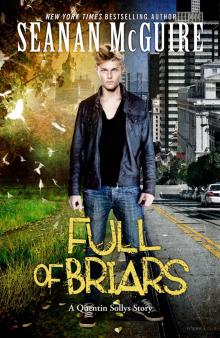 Full of Briars
Full of Briars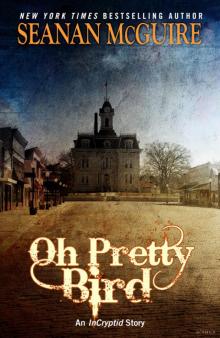 Oh Pretty Bird
Oh Pretty Bird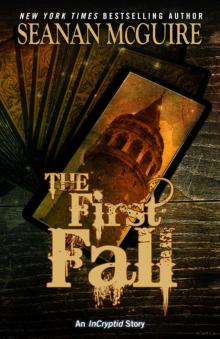 The First Fall
The First Fall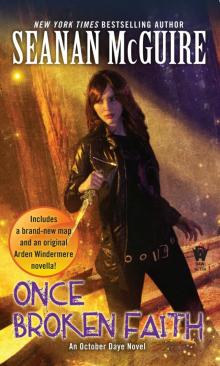 Once Broken Faith
Once Broken Faith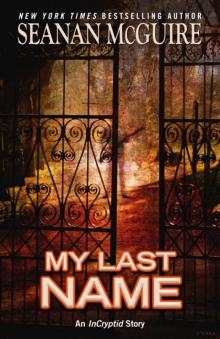 My Last Name
My Last Name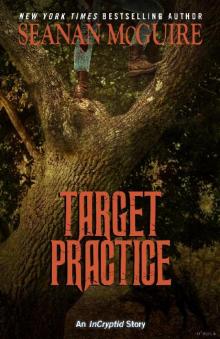 Target Practice
Target Practice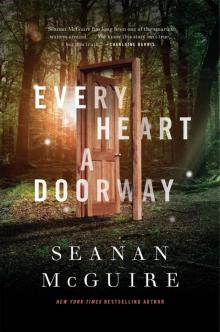 Wayward Children 01 - Every Heart a Doorway
Wayward Children 01 - Every Heart a Doorway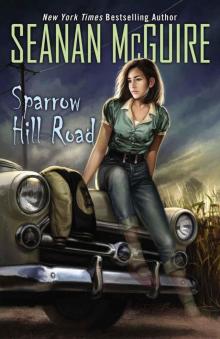 Sparrow Hill Road
Sparrow Hill Road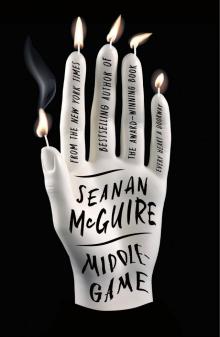 Middlegame
Middlegame Juice Like Wounds
Juice Like Wounds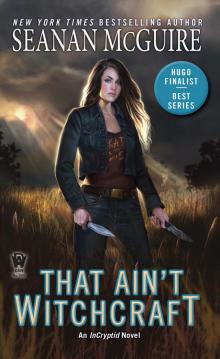 That Ain't Witchcraft
That Ain't Witchcraft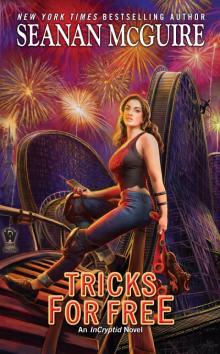 Tricks for Free
Tricks for Free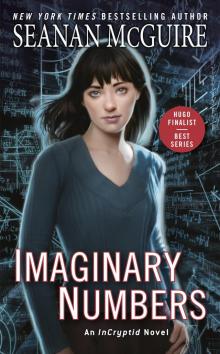 Imaginary Numbers
Imaginary Numbers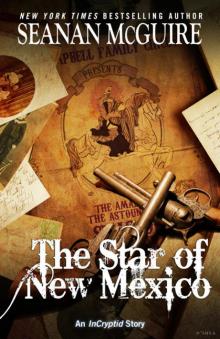 The Star of New Mexico
The Star of New Mexico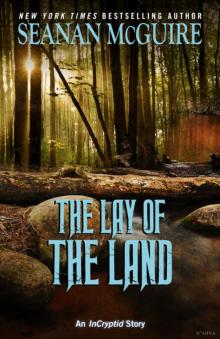 Lay of the Land
Lay of the Land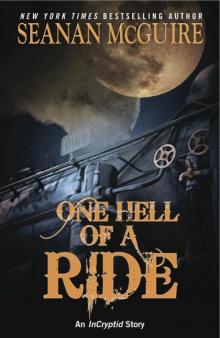 One Hell of a Ride
One Hell of a Ride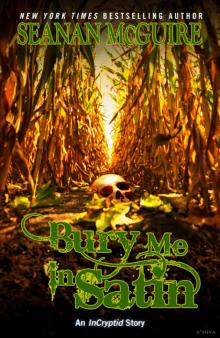 Bury Me in Satin
Bury Me in Satin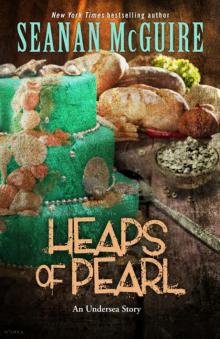 Heaps of Pearl
Heaps of Pearl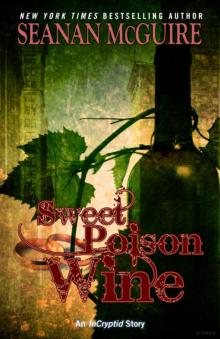 Sweet Poison Wine
Sweet Poison Wine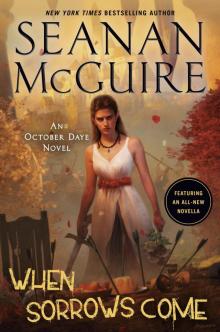 When Sorrows Come
When Sorrows Come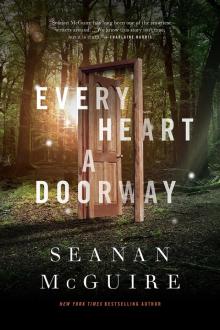 Every Heart a Doorway
Every Heart a Doorway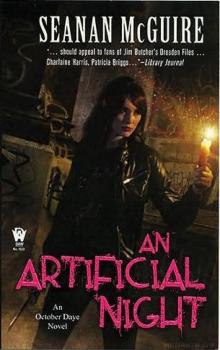 An Artificial Night - BK 3
An Artificial Night - BK 3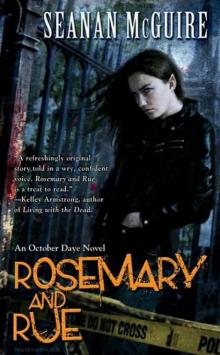 Rosemary and Rue
Rosemary and Rue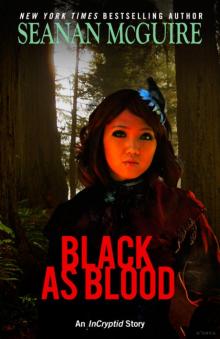 Black as Blood
Black as Blood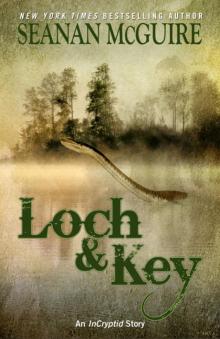 Loch and Key
Loch and Key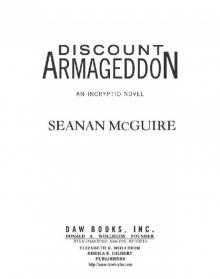 Discount Armageddon: An Incryptid Novel
Discount Armageddon: An Incryptid Novel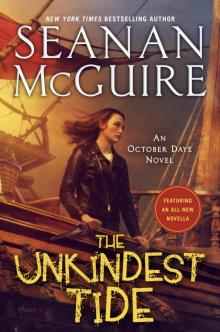 The Unkindest Tide
The Unkindest Tide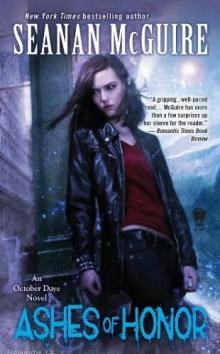 Ashes of Honor od-6
Ashes of Honor od-6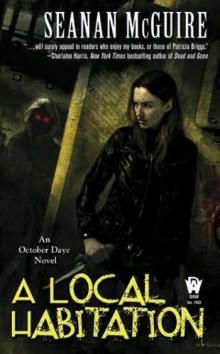 A Local Habitation od-2
A Local Habitation od-2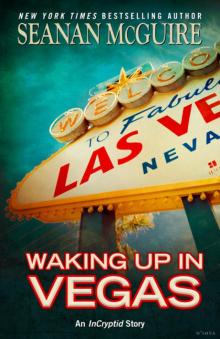 Waking Up in Vegas
Waking Up in Vegas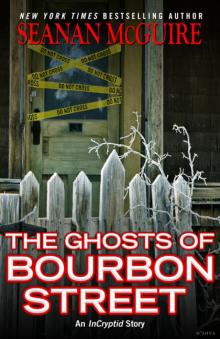 The Ghosts of Bourbon Street
The Ghosts of Bourbon Street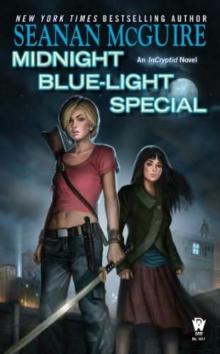 Midnight Blue-Light Special i-2
Midnight Blue-Light Special i-2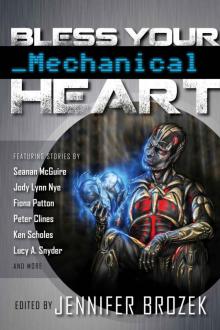 Bless Your Mechanical Heart
Bless Your Mechanical Heart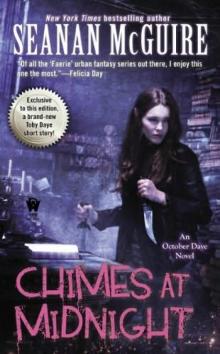 Chimes at Midnight od-7
Chimes at Midnight od-7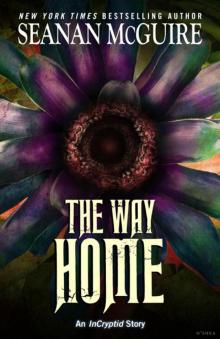 The Way Home
The Way Home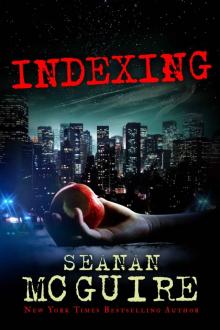 Indexing (Kindle Serial)
Indexing (Kindle Serial)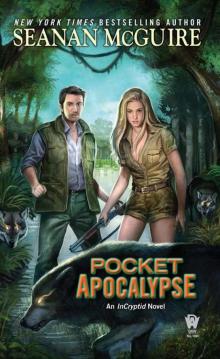 Pocket Apocalypse: InCryptid, Book Four
Pocket Apocalypse: InCryptid, Book Four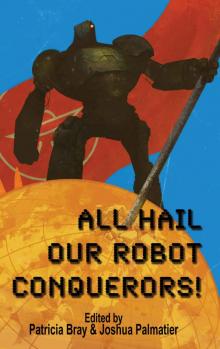 All Hail Our Robot Conquerors!
All Hail Our Robot Conquerors!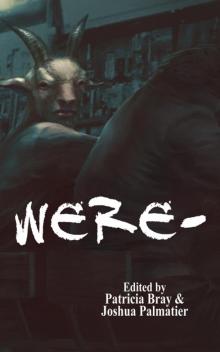 Were-
Were-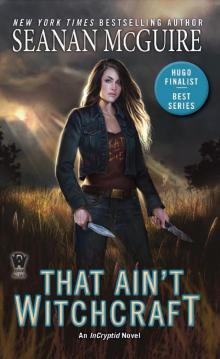 That Ain't Witchcraft (InCryptid #8)
That Ain't Witchcraft (InCryptid #8)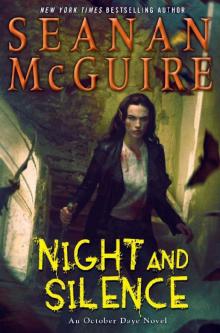 Night and Silence (October Daye)
Night and Silence (October Daye)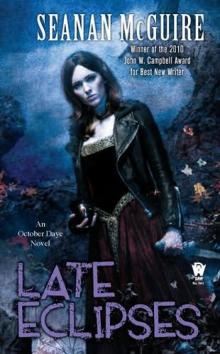 Late Eclipses od-4
Late Eclipses od-4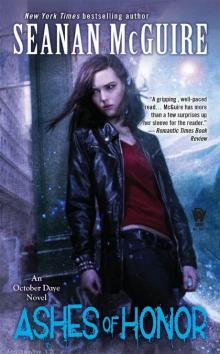 Ashes of Honor: An October Daye Novel
Ashes of Honor: An October Daye Novel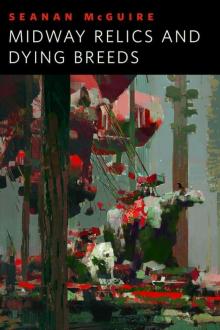 Midway Relics and Dying Breeds: A Tor.Com Original
Midway Relics and Dying Breeds: A Tor.Com Original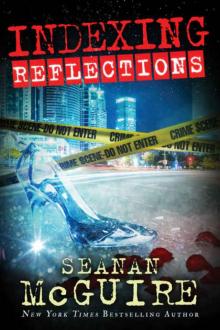 Indexing: Reflections (Kindle Serials) (Indexing Series Book 2)
Indexing: Reflections (Kindle Serials) (Indexing Series Book 2)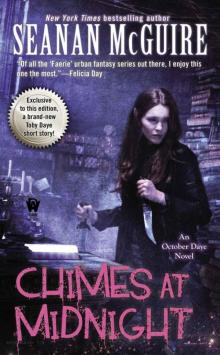 Chimes at Midnight: An October Daye Novel
Chimes at Midnight: An October Daye Novel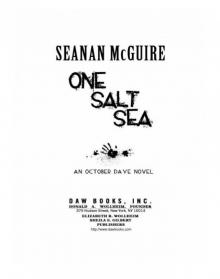 One Salt Sea: An October Daye Novel
One Salt Sea: An October Daye Novel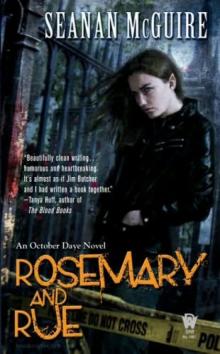 Rosemary and Rue od-1
Rosemary and Rue od-1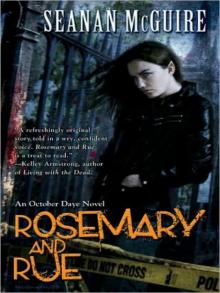 Rosemary and Rue: An October Daye Novel
Rosemary and Rue: An October Daye Novel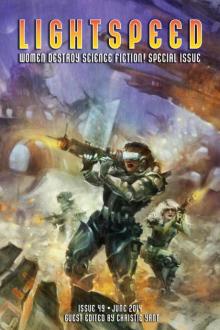 Lightspeed Magazine Issue 49
Lightspeed Magazine Issue 49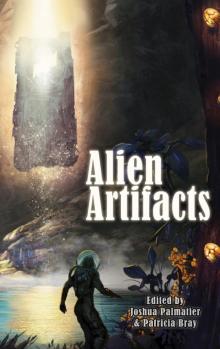 Alien Artifacts
Alien Artifacts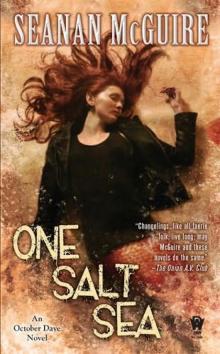 One Salt Sea od-5
One Salt Sea od-5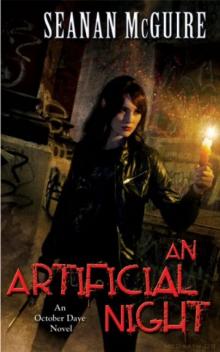 An Artificial Night od-3
An Artificial Night od-3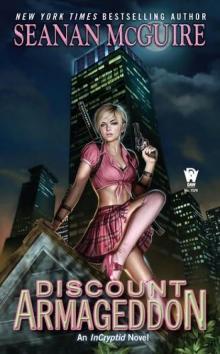 Discount Armageddon i-1
Discount Armageddon i-1